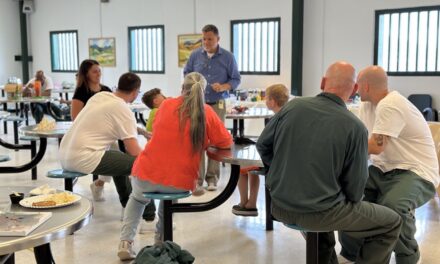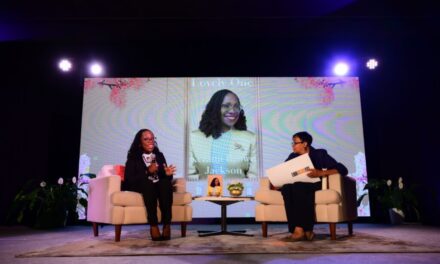Louise Pendry was teaching a psychology course in a cramped classroom at the University of Exeter when she found herself awkwardly climbing over her desk to allow students to come to the front and present. Her legs got caught in some equipment cables, and she lost her balance.
Pendry, a senior lecturer, quipped to her students, “I’m not the woman I used to be, clearly.”
Ironically, the course was about stereotyping. After class, a student suggested that Pendry had engaged in age bias — against herself.
“And I thought, ‘absolutely true,’” Pendry, 57, said. “You know what? Anybody would have struggled to clamber over those desks. It wasn’t just because I was older.”
Age bias doesn’t show up only as blatant discrimination (“We want someone younger for that job.”) or snarky birthday cards. One of the most potent sources of ageism comes from older people themselves, and like other forms of ageism, the self-inflicted kind is associated with lower levels of emotional and physical health and can slash years off people’s lives.
People, however, can shift these negative feelings to improve their well-being. When older people are reminded of the many positive things about aging, they can experience immediate benefits such as becoming stronger and having more will to live, said Becca Levy, a professor of epidemiology and psychology at the Yale School of Public Health who is a leading expert on the health effects of ageism.
“Age beliefs are not set in stone,” said Levy, author of “Breaking the Age Code: How Your Beliefs About Aging Determine How Long & Well You Live.” “They’re malleable. That’s a really key piece.”
What is internalized ageism?
Internalized ageism is the negative voice in a person’s head that may push them to take extreme measures to look younger (Madonna’s radical facelift) or tell themselves they’re having a “senior moment” every time they forget a name.
These attitudes are nearly universal: Over 80 percent of people between ages 50 and 80 subscribe to ageist stereotypes, according to a study led by Julie Ober Allen, assistant professor of health and exercise science at the University of Oklahoma.
The irony is that in reality, the vast majority of older people feel in good health and are satisfied with their lives. But you’d never know that from how older people are portrayed in advertising and entertainment — forgetful, cranky and frail.
It may seem counterintuitive to hold a prejudice against yourself, but internalized ageism takes hold in a sneaky way. It begins in childhood, with fairy tales about evil witches, and deepens over time thanks to negative messages we absorb from the media and society, experts on aging say. Then at some point, when we notice our hair graying or younger people start offering up their seats on the bus, the toxic age beliefs that we casually assimilated while they seemed to be about other people suddenly turn personal.
“The extent of older persons actually believing themselves to be inferior from others because of their age is staggering,” said Marvin Formosa, associate professor of gerontology at the University of Malta.
People deny their age, even to themselves, he said, and the fast-growing anti-aging industry caters to those impulses. Americans spent $5.4 billion in 2022 on anti-aging skin products, according to market research from Euromonitor International.
Anti-age bias doesn’t just sell anti-wrinkle creams. It affects how people think, feel and act.
In her research, Levy exposes older people subliminally to charged words about aging — positive stereotypes such as wise and accomplished, or negative ones such as senile and dependent — while they are playing a computer game. Before and after the game, her team asks participants to complete tasks such as reproducing from memory a dot pattern they’d previously viewed, talking about a stressful event, walking a short distance and balancing.
When people unconsciously absorbed uplifting words about aging, they showed improvements in memory, their blood pressure and heart rate were reduced while recounting a stressful event, and they walked faster and had better balance. Conversely, after unconsciously absorbing age negativity, participants had worse recall and a heightened stress response.
Levy has also tracked people over time and found that older people with more positive age beliefs were much less likely to develop dementia, even when they carried an Alzheimer’s gene.
In another study, she found that people who had internalized more positive age beliefs lived, on average, 7.5 years longer. Research by other teams has confirmed her findings.
Levy’s hypothesis, based on her research, is that internalized ageism worsens health through three mechanisms.
- When you think decline is inevitable, you’re less motivated to take your medicine, eat well and exercise.
- Feeling bad about getting old can lower self-confidence, which can make people withdraw (one recent study, for example, found that internalized ageism made people want to retire early).
- Negative emotions about aging can raise people’s biological stress levels, putting them at risk for heart disease and stroke.
‘Snap Out of It!’
Mariann Aalda had a long career acting on “The Edge of Night” and other shows, but when she hit her 50s, the jobs dried up. “A lot of my career, I was an appendage to a man. I was the wife, I was the girlfriend, I was the pretty girl,” she says. “Well, what do you do with the pretty girl when she gets old?”
Her agent’s solution was for her to gain 50 pounds and become a character actor. Aalda refused. As a Black woman, she recognized that this was just a different form of discrimination.
Aalda, 75, began creating and performing shows lampooning the idea that older women aren’t sexy and powerful. Her first show was “Snap Out of It! You’ve Only Been Hypnotized Into Believing You’re Over the Hill.”
At the performance, she passed out rubber bands and told audience members to pluck them every time they noticed an ageist thought. “You have to have an awareness that you’re doing it. So when you go, ‘Oh, there I go again,’ snap,” she said. “Because it’s just a habit.”
How to reduce internalized ageism
Changing habits is also key to Levy’s three-part strategy to reduce internalized ageism.
- Recognize ageism. “If we’re not aware of some of that messaging, then it’s hard to resist it and question it and not take it in,” Levy said.
- Shift the blame from age to ageism. A doctor told Janine Vanderburg, of North Fork Valley, Colo., that her knee hurt because she was getting older. Vanderburg, 70, thought, “Then why does my other knee feel fine? It’s the same age.” She insisted on an MRI; “I had to push for that.”
- Challenge anti-aging messages in advertising, politics, everyday conversations — and your own thoughts.
People who have a purpose and feel confident they can achieve their goals may be less susceptible to internalized ageism, said Andrew Steward, assistant professor of social work at the University of Wisconsin at Milwaukee.
He and a colleague tested whether exercise, volunteering and computer use reduced people’s negative age beliefs, and found that older people who participate in these activities had more positive self-perceptions about aging. “If we engage in a healthy lifestyle in these variety of ways, that can mitigate the negative impacts of internalized ageism,” he says.
Internalized ageism is so normalized it can be hard to spot. It even comes in the form of compliments such as, “You haven’t changed a bit” or “You don’t look your age.” Last year, Aalda created an Instagram project — Say Your Age! — for women to “out” themselves as the age they are, and in June, ageism activist and fashion entrepreneur Jacynth Bassett’s social media campaign, #ILookMyAge, went viral.
Thousands of people, mostly women, have posted exuberant photos and videos of themselves, and content related to the hashtag has gotten more than 27 million views.
“When people say you don’t look your age, well actually, you’re basing that on your internalized ageist attitude of what it means to look a certain age,” Bassett said. “You have this box.”




